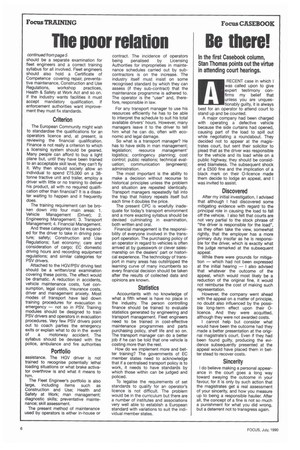Be there!
Page 8

If you've noticed an error in this article please click here to report it so we can fix it.
RECENT case in which I was called upon to give expert testimony confirms my belief that unless you are unquestionably guilty, it is always best for an operator to attend court to stand up and be counted.
A major company had been charged with operating a defective vehicle because the side curtains had opened, causing part of the load to spill out while negotiating a roundabout. They decided not to appear at the magistrates court, but sent their solicitor to plead that as the driver was responsible for the vehicle and its load while on a public highway, they should be considered blameless. The subsequent shock of a 2500 fine and the implication of a black mark on their 0-licence made them decide to lodge an appeal, and I was invited to assist.
A
After my initial investigation, I advised that although I had discovered some mitigating evidence with regard to the principal role in causing the load to fall off the vehicle. I also felt that courts are not very partial to the stock phrase of "the driver is responsible for the load", as they often take the view, somewhat rightly, that the employer has a more primary duty insofar as he is responsible for the driver, which is exactly what the judge remarked at the subsequent appeal.
While there were grounds for mitigation — which had not been expressed at the initial hearing — I also advised that whatever the outcome of the appeal, which would most likely be a reduction of the original fine, it would not reimburse the cost of making such representation.
However, the company went ahead with the appeal on a matter of principle, no doubt also influenced by the possible long-term effect upon their 0licence. And they were acquitted, although they were not awarded costs.
I cannot help but consider what would have been the outcome had they made a better presentation at the original magistrate's court. Even if they had been found guilty, producing the evidence subsequently presented at the appeal would have placed them in better stead to recover costs.
I do believe making a personal appearance in the court goes a long way toward swaying the outcome in your favour, for it is only by such action that the magistrates get a real assessment of your sincerity, and how you measure up to being a responsible haulier. After all, the concept of a fine is not so much a punishment for what you did wrong, but a deterrent not to transgress again.




































































































